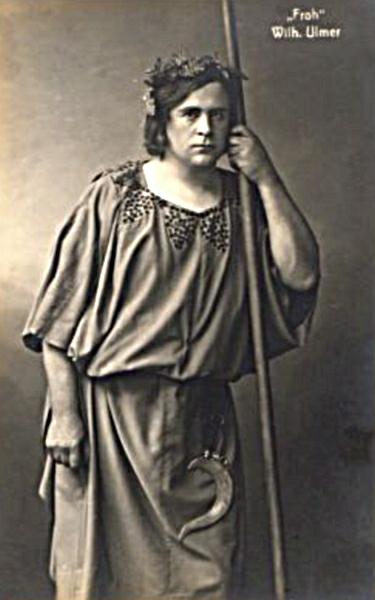Wilhelm Ulmer
Wilhelm Ulmer as Froh
Wilhelm Ulmer was born in Munich on January 15th, 1879. His father was a businessman, and he first
worked in his father's business. In 1906, Ulmer took singing lessons, and against his father's
will he decided
to become a singer. He made his debut in Augsburg as Siegmund. The issue of February 1910 of
Die Musik wrote:
In one of the performance of Die Walküre, Willi Ulmer dared to make his stage debut as Siegmund.
It was not bad, and he showed musical and acting abilities.
After receiving good reviews in Tannhäuser, Siegfried Wagner invited for a test in Bayreruth.
As a result, Siegfried Wagner
promised to keep an eye on him. Ulmer moved to the Zürich Stadttheater in 1910.
There he sang in the local premiere of Parsifal on April 13th, 1913. At that time, Siegfried Wagner sent
Kapellmeister Carl Kittel to Zürich. As a result, Siegfried Wagner decided to call him
to Bayreuth during the summer of 1913 for further studies. After another Parsifal on August 31st, 1913 in
Zürich, Ulmer was invited to sing Froh, Parsifal, and Siegmund in Bayreuth in 1914.
Karl Grundsky in the magazine Musik wrote:
...small, somewhat soft voice with nice musical qualities and noble acting.
Ulmer's Bayreuth career was almost finished after it just started. He was Bayreuth's last
Parsifal (July 31st) before the festival closed down for 10 years due to the start of the war.
He had just been hired in Düsseldorf when the war started, and was called immediately by the military.
Graf von Bylandt (intendant in Kassel) managed, during one of Ulmer's home visits during the war,
to get him to sing in Kassel, where he performed Siegmund with great success.
Graf von Bylandt and Kapellmeister Laugs wanted to hire him immediately for Kassel, but had not the necessary influence
to get him out of the army. Ulmer had to serve until the end of the war. He restarted his singing career
in 1918 in Elberfeld, but could not live up to his
previous success. After 1925, his name can no longer be found in the different yearbooks
of the German theaters.
Reference 1: Einhard Luther, So viel der Helden. Biographie eines Stimmfaches, Teil 3: Wagnertenöre der Kaiserzeit (1871–1918), Berlin 2006
Reference 2: Einhard Luther, Helden an geweihtem Ort. Biographie eines
Stimmfaches, Teil 2: Wagnertenöre in Bayreuth (1894–1914), Trossingen – Berlin 2002
|
